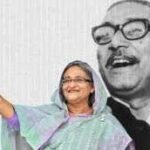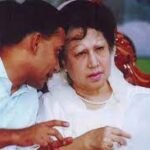Sheikh Hasina won historically in polls and will serve a straight 4th term in Bangladesh which was held on 7th January, Her Party Awami League secured a majority in the National elections.
PM Hasina has won Gopalganj-3 Constituency almost unopposed bagging 2,49,962 votes.
The main opposition party BNP boycotted the election after Hasina refused to resign and allowed neutral authority to run the election.
How is Hasina ruling unilaterally in Bangladesh?
Prime Minister Hasina is all set to take charge of Bangladesh for a fifth term as Prime Minister, it is the fifth term in total for Ms. Hasina, who first became prime minister in 1996 and was re-elected in 2009, remaining in power since.
is the fifth term in total for Ms. Hasina, who first became prime minister in 1996 and was re-elected in 2009, remaining in power since.
Her family has a prominent name in Bangladesh, we can say that in dynasty politics in Bangladesh, only two parties are active, one is BNP whose main leader Khaleda Zia is jailed, and her son Tarique Rahman is in exile, and the other is Hasina’s family. 
No other political party has won an election in Bangladesh after 2009 and she is ruling unilaterally, wielding authority with an iron grip. Her dominion is marked by the relentless exercise of power, the jailing of many opposition leaders and ongoing action against those who oppose her raising serious questions about her policies. 
During her regime Bangladesh has seen economic growth, the nation’s economy has been stabilized and the garment industry has been greatly boosted by the prime minister Hasina. But since the middle of 2022, the growth has slowed, and analysts predict that the next administration will face significant difficulties maintaining economic stability.
she is accused of oppressing opposition, and they alleged that she doesn’t follow democratic rules and she is behaving like a dictator.
Why has opposition opposed the election?
Election results come after mass arrests of BNP leaders and supporters.
 There were questions raised about the validity and legitimacy of the election, Hasina is accused of oppressing the opposition, who has the potential to defeat her in the election.
There were questions raised about the validity and legitimacy of the election, Hasina is accused of oppressing the opposition, who has the potential to defeat her in the election.
Tarique Rahman, the leader of the exiled opposition, has called the election a “sham” intended to cement Hasina’s control.
 In 2023, Rahman’s party organized a months-long protest campaign calling for the prime minister to resign, during which thousands of its followers were detained and at least 11 people were killed.
In 2023, Rahman’s party organized a months-long protest campaign calling for the prime minister to resign, during which thousands of its followers were detained and at least 11 people were killed.
The reason the BNP is not running is that Hasina turned down its request to hand over control of the election to a caretaker government.
Earlier a Court in Bangladesh sentenced six months jail to Nobel Laureate and economist Muhammad Yunus, who was seen as the main rival of Hasina.
However, Hasina has denied all these claims and accused the opposition of fueling anti-government protests.
Low turnout in polls indicate voters’ dissatisfaction with Hasina.
After the opposition boycotted the election, the Bangladesh election became a major highlight. It was very clear that Haina’s another term in Bangladesh; however, the official figures suggested a low voter turnout of about 40%. In comparison, the last election in 2018 had a voter turnout of more than 80 %. 
“Go to the polling stations and cast votes in the morning to show the world that we know how to hold the election in a free and fair manner,” Hasina had said in her campaign rally and about her allegations about behaving like a dictator she said, “I am trying my best to ensure that democracy should continue in this country”.
The Bangladesh Awami League said,” Around 40% of people have come and voted in our country, if you look at some of the European Democracies, there are several cases where turnout has been less than 40 % no one has questioned the legitimacy or validity of that election so why should Bangladesh be any different”.











Comments 1